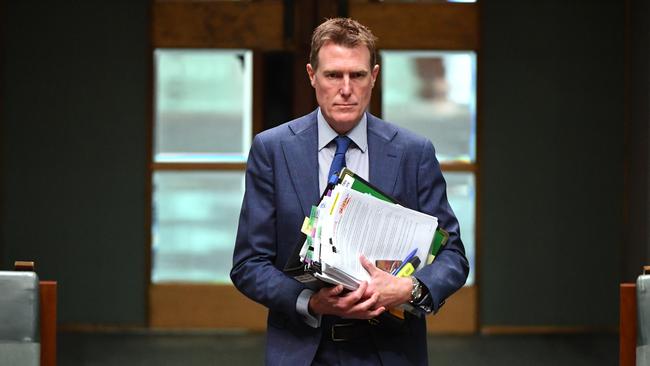Army’s reports kept secret to avoid flak on social media
The Department of Defence has kept under wraps a series of reports into the Australian Army’s culture because it fears a backlash on social media.

The Department of Defence has kept a series of reports into the culture within the Australian Army under wraps, claiming that their release would jeopardise any possible improvements and have the potential to fuel a social media backlash.
The latest example of government secrecy can be revealed as Scott Morrison’s Coalition came under strong criticism from former Liberal leaders over press freedom, with Jeff Kennett warning that the separation of powers had been “totally blurred” and John Hewson urging “serious” reforms to halt “abuse of power”.
The government’s refusal to provide access to information is one of the motivating factors behind a letter media organisations sent on Tuesday to all 227 federal MPs, sounding the alarm on a growing culture of government secrecy. The letter — signed on behalf of 19 media organisations by News Corp Australia’s corporate affairs director Campbell Reid — said that laws needed to “strike the right balance” and too many passed in recent years were at odds with “an open and transparent society”.
- READ MORE: Request delays hurting democracy | Submarines leak may have saved lives | Year-long backlog for FOI reviews | Qld government won’t release climate risk documents
Nine months ago, a Freedom of Information decision-maker rejected the latest request by The Australian to obtain official reviews into army culture led by private consultant and expert sociologist Samantha Crompvoets. Sources have told several media outlets, including The Australian, that one of her reports, on the Special Air Service regiment, reveals a culture of drug and alcohol abuse, domestic violence and allegations of unlawful activity. It was based on interviews with serving members and prompted an inquiry, but the report’s findings remain a secret.
The request for the reports to be released was denied because the decision-maker said the inevitable public debate triggered by the release of the reports would be too disruptive.
“I note the development of active social media capability in recent years ensures that people can be influenced in short time with broad effect by sensationalism,” the decision-maker warned.
“Army’s culture has been the subject of scrutiny on social media in recent years. The elimination of any bias and sensationalism on social media will allow Army to instil cultural change with the least disruption in the shortest possible time.”

The Australian sought a review by the Information Commissioner in February but, based on current trends and timeframes, a decision on this appeal may not be made until mid- to late next year.
In their letter to federal politicians, the media companies behind Australia’s Your Right To Know campaign said they were asking for “commonsense changes to laws” so that the “unique role journalists have in serving society is acknowledged”.
“In the countries that share our democratic values, this responsibility is enshrined and protected in their constitutions and guiding documents,” the media companies said. “In Australia, there is no such protection for freedom of speech and that is why we are fighting for it now.”
Media companies united on Monday to publish heavily redacted front pages of newspapers nationwide, to highlight their campaign against increasing government secrecy and the difficulty in holding governments to account.
Anthony Albanese used question time on Tuesday to ask why Scott Morrison had said on Monday that politicians should not determine whether individuals were prosecuted, given that Attorney-General Christian Porter had last month given himself new powers to make the final call on whether to take journalists to court for exposing government secrets.
The Prime Minister said Mr Porter’s new powers still allowed for “investigative authorities to look at these matters” and to hand relevant information over to prosecution authorities before the Attorney-General would be required to make a decision.
“What the Leader of the Opposition wants to do is throw that all away,” Mr Morrison said.
“And he wants to make the decision if he were prime minister about who gets prosecuted or who doesn’t — even before those agencies … have even considered the matter.”
But the media companies — including News Corp Australia, the ABC, SBS, Nine, the Ten Network, Sky News, The Guardian, Seven West Media, AAP and Prime Media Group — strengthened their opposition to Mr Porter’s new powers.
“The Prime Minister told parliament this week Australians would not want to live in a country where politicians on a whim could decide who gets prosecuted and who doesn’t,” the media organisations said in their letter.
“We couldn’t agree more. And yet we do live in that country. The Attorney-General — a politician — has the power to decide if journalists will be prosecuted … We do not believe an individual politician should be placed in the dangerous position of being the final arbiter of whether or not a person should be prosecuted.
“We believe that laws that put a politician in this compromising position should be amended so this situation does not arise.”
Last month, Mr Porter issued a directive under section 8 of the Commonwealth Director of Public Prosecutions Act that requires the Attorney-General’s consent for the prosecution of any journalist for alleged breaches of the Criminal Code, the ASIO Act, Defence Act and Crimes Act over their reporting.
Senior Liberal figures criticised the Morrison government on Tuesday over press freedom.
Mr Kennett, Victorian premier from 1992 to 1999, said that while he did not believe there was a culture of secrecy in Australia, the move by Mr Porter to decide on prosecution of journalists “totally blurs the separation of powers”.
“I’m not comfortable with that — it should not be in the hands of a politician,” Mr Kennett said. “That should be left to the courts and the law-enforcement agencies. Once you put these things in the hands of politicians, the whole system then becomes questionable.”
He said he believed “the national interest” should have “supremacy” over the right of journalists to pursue stories, but this should not hinder journalists who acted responsibly. “I do not think it’s right that a politician, whether it be an attorney-general, a prime minister, or a premier, sits in judgment of what’s right and wrong,” Mr Kennett said.
Dr Hewson, federal opposition leader from 1990 to 1993, said the government had “lost sight” of the importance of press freedom.
“They haven’t been able to explain the AFP raids … The government ducks and weaves around this and Scott Morrison’s fob-off saying ‘nobody’s above the law’ is very Trumpian,” Dr Hewson said.
He added that Mr Porter’s decision to take on the role of vetting prosecutions of journalists for secrecy or national security breaches was “ridiculous”.
“It doesn’t matter which party is in power, you cannot leave that discretion to an individual, particularly a government minister, who will probably be more focused on a political agenda than a justice agenda,” Dr Hewson said.
He said there was a need to bolster press freedom by legislation or even constitutional recognition.



To join the conversation, please log in. Don't have an account? Register
Join the conversation, you are commenting as Logout